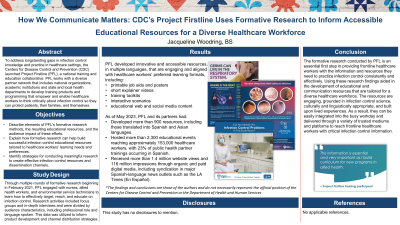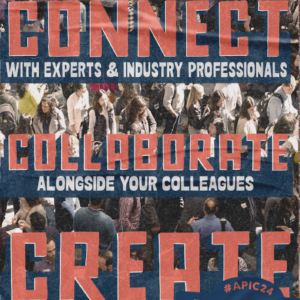Education, Training and Competencies
Category: Education, Training and Competencies
Poster Theater Session I
ETC 49 - How We Communicate Matters: CDC’s Project Firstline Uses Formative Research to Inform Accessible Educational Resources for a Diverse Healthcare Workforce
Monday, June 3, 2024
10:37 AM - 10:42 AM CST
Location: Digital Poster Theater - APIC Central, Hall 1


Jacqueline Woodring, BS
Health Communications Specialist
Centers for Disease Control and Prevention
Presenter(s)
Disclosure(s):
Jacqueline Woodring, BS: No financial relationships to disclose
Background: To address longstanding gaps in infection control knowledge and practice in healthcare settings, the Centers for Disease Control and Prevention (CDC) launched Project Firstline (PFL), a national training and education collaborative. PFL works with a diverse partner network that includes national organizations, academic institutions and state and local health departments to develop training products and programming that empower and enable healthcare workers to think critically about infection control so they can protect patients, their families, and themselves.
Methods: Through multiple rounds of formative research beginning in February 2021, PFL engaged with nurses, allied health workers, and environmental service technicians to learn how to effectively target, reach, and educate on infection control. Research activities included focus groups and in-depth interviews and were divided by audience characteristics, including professional role and language spoken. This data was utilized to inform product development and channel distribution strategies.
Results: PFL developed innovative and accessible resources that are engaging and aligned with healthcare workers needs and preferences. Resources include educational web and social media content, short explainer videos, printable job aids and posters, training toolkits and session plans, and interactive scenarios. As of May 2023, PFL and its partners have developed more than 900 resources, hosted more than 2,300 educational events reaching approximately 153,000 healthcare workers, and received more than 142 million views and impressions across various digital and social media platforms.
Conclusions: The research conducted by PFL is an essential first step in providing frontline healthcare workers with the tools and resources they need to practice infection control consistently and effectively. The resources developed from these intentional research efforts are engaging, grounded in infection control science, and built upon lived experiences so they can be used on the job and delivered through a variety of trusted mediums and platforms to reach frontline healthcare workers.
Learning Objectives:
- Upon completion, participant will be able to describe different elements of Project Firstline's formative research methods, the resulting educational resources, and the audience impact of these efforts.
- Upon completion, participant will be able to explain how formative research can help build successful infection control educational resources tailored to healthcare workers' learning needs and preferences.
- Upon completion, participant will be able to identify strategies for conducting meaningful research in order to create effective infection control resources and dissemination channels.

